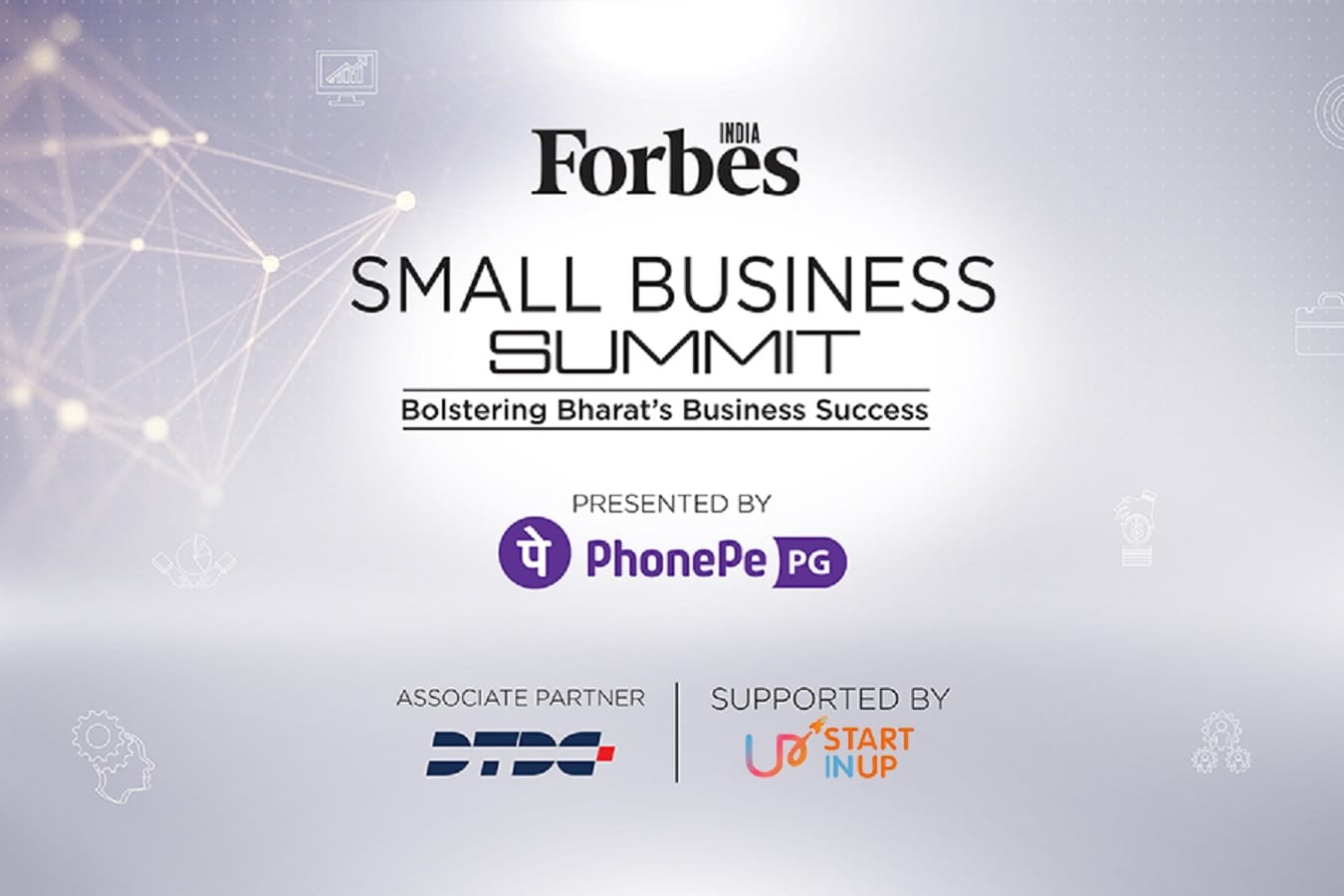
Small businesses and start-ups are at the heart of India’s economic transformation, contributing significantly to growth, employment and exports. For India to become the third largest economy in the world, scaling of these enterprises becomes crucial. The Forbes India Small Business Summit, presented by PhonePe Payment Gateway (PhonePe PG), aims to explore how these vibrant businesses can achieve global success through digital innovation and collaboration. Bringing together a diverse array of entrepreneurs, business leaders, policymakers, and key enablers, the summit seeks to provide aspiring entrepreneurs with the tools, resources, and support they need for success. Critical discussions highlighted the need to bridge gaps in funding, infrastructure, and access to digital tools, which are essential for the sustained growth of MSMEs in India. The summit’s journey began with a series of SMB Huddles, kicking off in Chennai and Lucknow, with two more planned in Indore and Pune, followed by a grand finale in Delhi.
The Lucknow Huddle
After the resounding success of the Chennai Huddle, the event in Lucknow carried forward the momentum with conversations around small businesses and how they can be empowered to scale and succeed. Hosted on September 13, 2024, the Lucknow Huddle, themed ‘Growth at the Grassroots: On the Path to Scale and Success with India’s MSMEs’, focused on how successes in the space, within Uttar Pradesh (UP) could serve as a model for the rest of India, fostering growth for MSMEs nationwide.
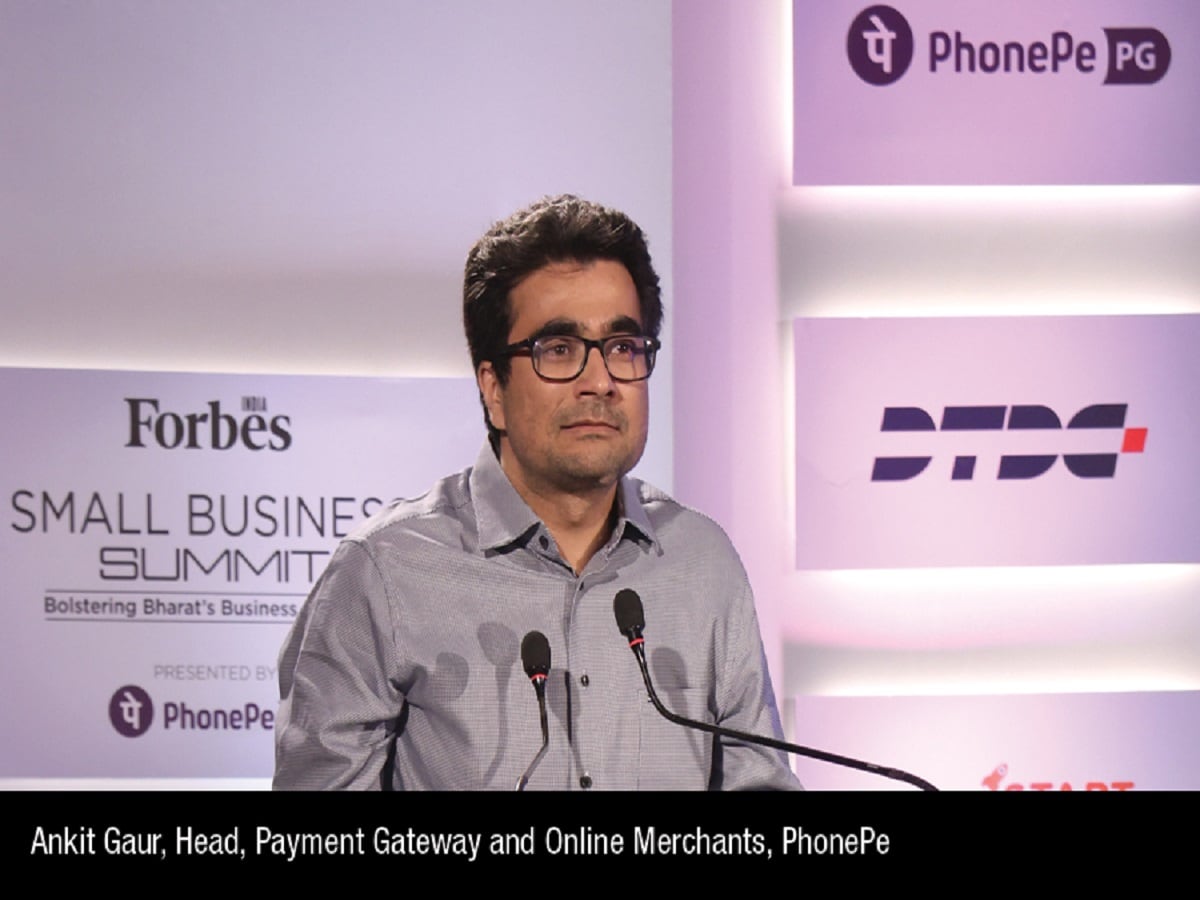
Unveiling Opportunities through Tech
Innaugrating the summit, Ankit Gaur, Head of Payment Gateway and Online Merchants at PhonePe, delivered an insightful opening address. He emphasized the critical role that MSMEs play in India’s economy, saying, “India’s economic engine is its SME and MSME sector, which blends tradition with innovation and local pride with global ambition. Now, digital transformation is reshaping how these businesses operate and grow.” He highlighted how traditional businesses are now adopting technology and thereby transitioning to digital payment methods, improving their processes, gaining consumer insights, and building credit histories. These shifts are unlocking financing opportunities that never existed before. “The journey from offline to online is significant—it’s a transformation that requires courage and adaptability. But MSMEs are not alone in this,” Ankit Gaur assured.
He also spoke about the power of collaboration, stressing that the success of enterprises is intertwined with their ecosystem of suppliers, customers, and sometimes, even competitors. In conclusion, he reiterated that with the right digital tools, government initiatives like Aatmanirbhar Bharat, and collaboration, MSMEs are well-positioned to lead India’s growth story.
Unlocking MSME Growth Potential
The evening progressed with panel discussions that showcased luminaries from the MSME space. The first one, titled ‘Unlocking MSME Growth Potential,’ featured a stellar line-up of distinguished speakers, including Gaurav Prakash, Chairman MSME, Confederation of Indian Micro, Small, and Medium Enterprises; Pravin Singh, Managing Director, UP Industrial Consultancy; Rajata Mehra, Head – Policy Advocacy Cell, CII UP State Council; Anandi Agarwal, Chairperson, Women Entrepreneurial Cell Indian Industries Association and Vikas Srivastava, AGM Business Management, DTDC Express.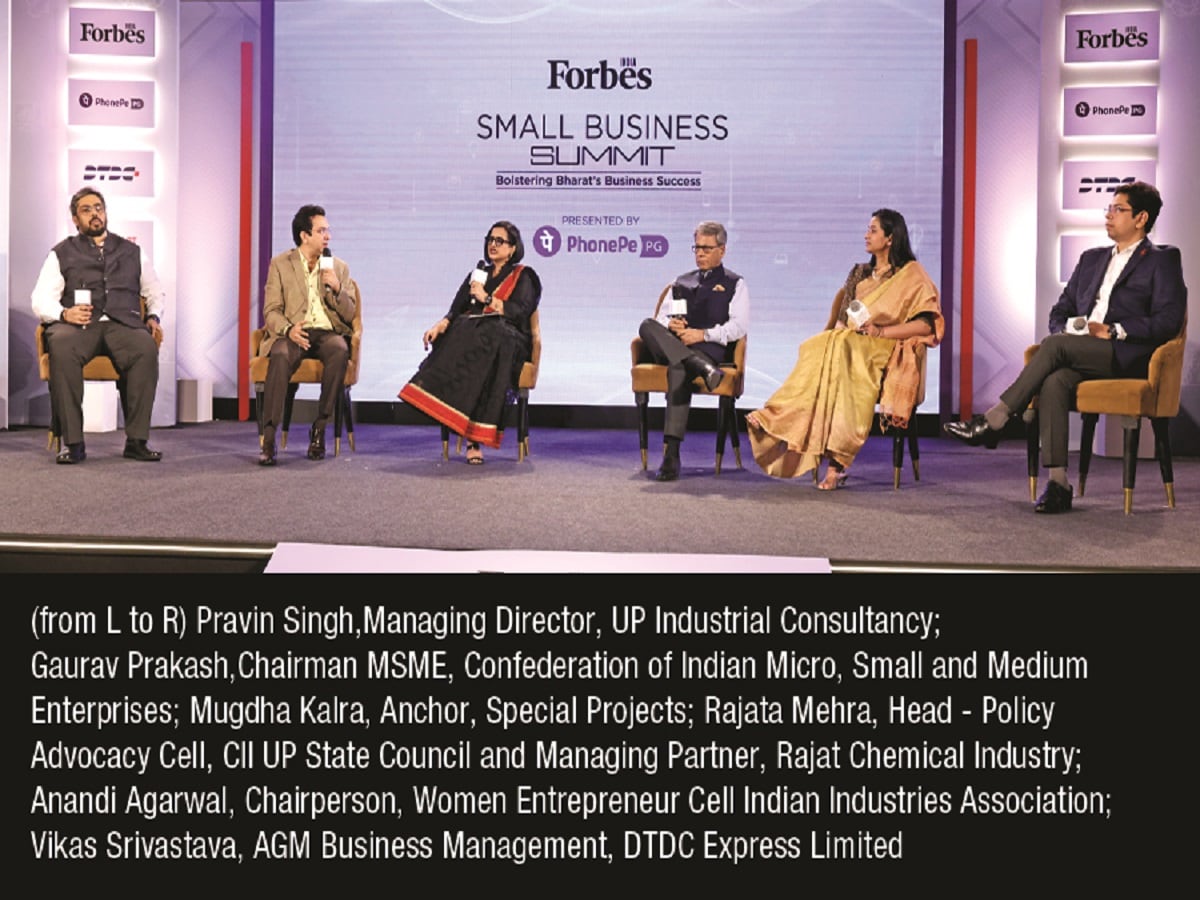
The panel explored the various challenges and opportunities facing MSMEs, with a focus on UP’s significant role in the sector. The discussion highlighted how micro-industries are a crucial part of the state’s economy, but emphasized the need for a more supportive environment to help these businesses grow and scale. Specific gaps were identified, including the need for improved funding access and the establishment of more industrial hubs to create positive network effects for MSMEs. The conversation underscored how digital tools, such as digital transactions and credit linkages, have become vital in helping MSMEs realize their potential, a trend that accelerated due to the pandemic.
Increasing access to credit was highlighted as a major challenge, with discussions focusing on how only a marginal supply of the required MSME credit is currently sourced via commercial banks, necessitating innovative solutions and policy interventions. Regulatory compliance was also a key topic, with panellists stressing the importance of adhering to frameworks, like ESG reporting, to attract foreign investment. The challenges faced by women-led businesses were also discussed, particularly the lack of awareness about available opportunities and difficulties accessing funding. Additionally, the panel addressed how digitalization is revolutionizing logistics, enabling even the smallest enterprises to compete effectively in the e-commerce era by providing real-time tracking to customers and expanding market reach.
Technology Transformations in SMBs
The second panel, titled ‘From Cottage to Cutting-edge: How Technology Can Transform India’s Small Businesses’, focused on how digital transformation can propel MSMEs from local markets to global platforms. The panellists — Ankit Gaur, Head of Payment Gateway and Online Merchants, PhonePe; Krishan Guptaa, Managing Director, Organic Wellness; Vartika Punjabi, COO & Brand Strategist, Ada Designer Chikan Studio and Umang Gupta, VP & Regional Director, IndiaMART — showcased real-world examples of how businesses are embracing technology.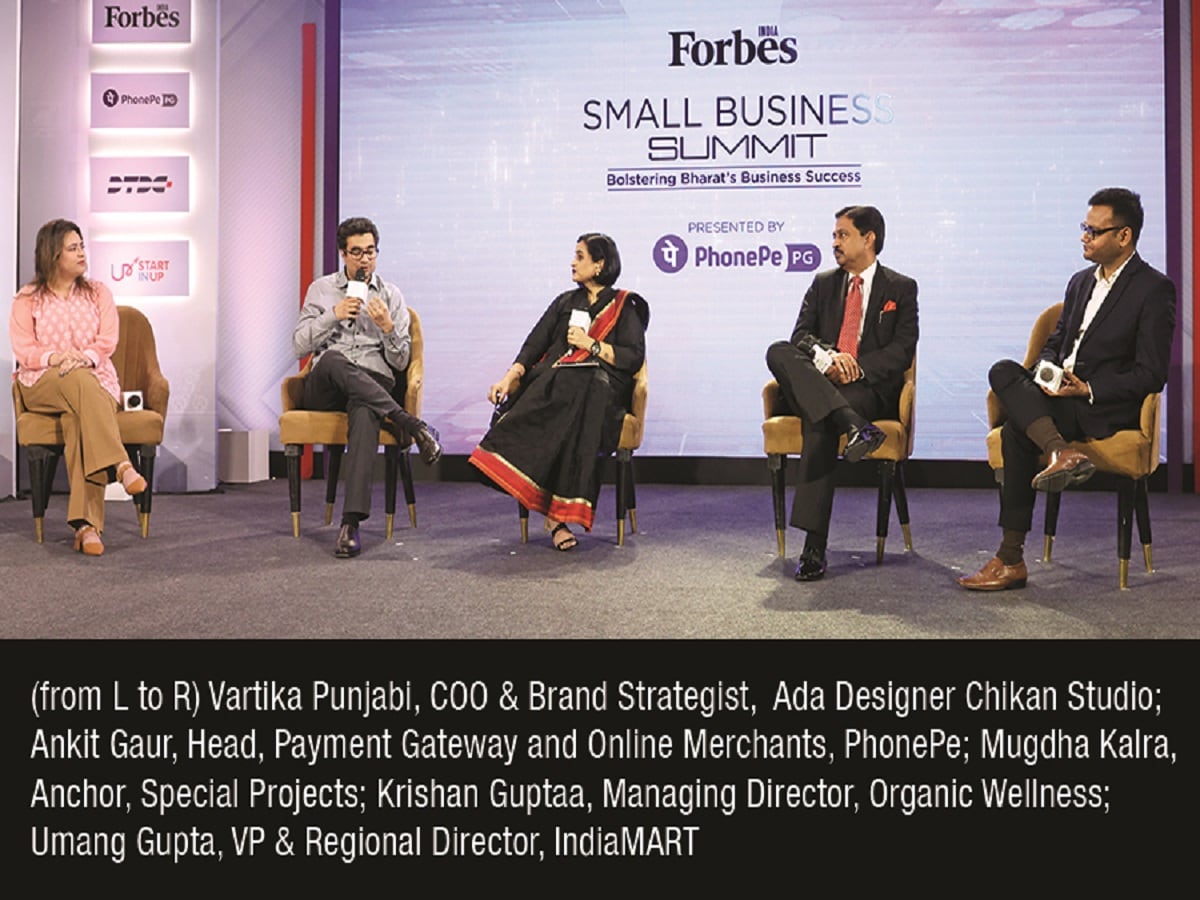
Reflecting on the remarkable innovation that MSMEs have been driving, the participants narrated how digital transformation has significantly accelerated progress in the sector. They stressed the importance of building an online-ready MSME ecosystem, focusing on digital marketing strategies, optimizing digital payment methods, and enabling MSMEs through digital-friendly regulations. The panellists shared how enablers, like digital platforms and payment gateways, need to keep evolving to support the rapid advancements that these businesses are achieving. Narrating their inspiring stories, they illustrated the power of digital tools and their ability to not only enhance efficiencies but also expand markets, very rapidly.
The discussion also touched on the dramatic shift in consumer behaviour, with digital adoption accelerating at an unprecedented pace due to the pandemic. Panelists highlighted the advantages of modular digitalization, which allows MSMEs to control the pace of their digitization journey, making it accessible even for smaller players. Finally, the panel highlighted how platforms tailored for MSMEs are empowering small businesses to better understand their competitive landscape, improve product positioning, and leverage technology to scale.
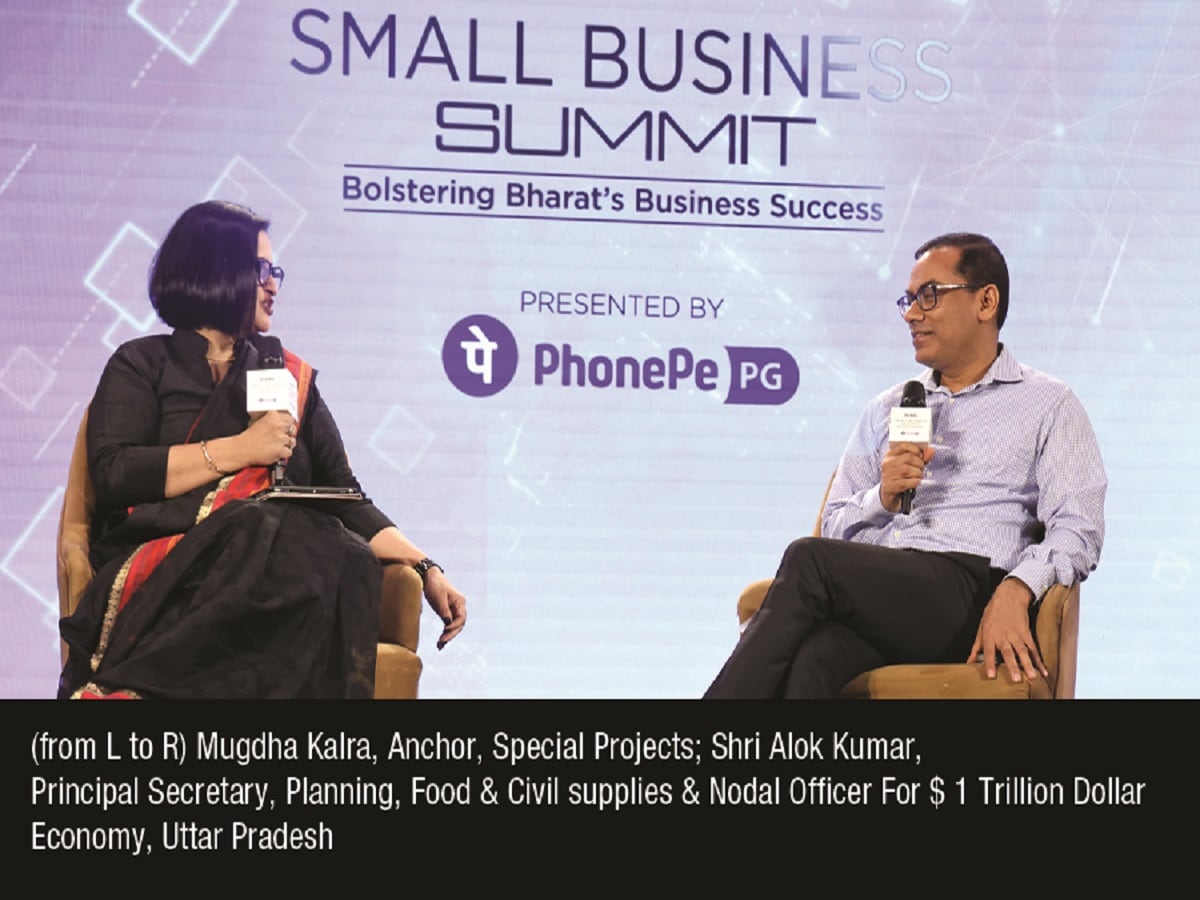
Vision for UP’s MSMEs
In an engaging fireside chat that followed, Alok Kumar, Principal Secretary of Planning, Food and Civil Supplies and Nodal Officer for UP’s $1 trillion economy target, explained his vision for the state’s MSME sector, saying, ” We endeavour to support our artisans by offering them proper guidance and facilities and policies that will help them continuously improve their product quality. Additionally, we want to ensure they have access to markets and encourage them to explore export opportunities.” He discussed the government’s efforts to provide broader skill development programs for UP’s youth, streamline regulations by removing out-dated laws, and introduce single-window clearance. He emphasized the need for incentivizing more MSMEs to register on the Udyam portal to formalize the sector and unlock more support opportunities. He also mentioned modes of funding available to UP’s start-ups, via government funded AIFs and its Fund of Funds. The Principal Secretary concluded by reiterating UP’s ambitious goal of becoming a $1 trillion economy by 2027, for which it relies heavily on MSMEs delivering on their potential.
Embracing innovation and technology
The evening concluded with a felicitation ceremony, recognizing the outstanding achievements of small and medium enterprises that have not only excelled in their respective fields but also embraced digital transformation, setting a benchmark for others. The companies honoured for their innovation and contributions to the sector included Greenday, Greenwear Fashion, DocPlix, Triveni Chikan Arts, BOLT Infotech, AuthIndia, Morphedo, Study At Home, Ampius Technologies, and The Kraftors. As pivotal contributors to the growth of the MSME sector their resilience and visionary approach serves as a source of inspiration to others in their space.
Tools, Talent and Commitment
The Lucknow Huddle showcased the resilience, potential, and innovation of MSMEs and offered a roadmap for scaling these businesses and driving the country’s economic success. As Ankit Gaur observed, “With the right tools, talent, and commitment to change, MSMEs can scale beyond their traditional boundaries and become global players. The future is digital, and the opportunities are limitless.”
The pages slugged ‘Brand Connect’ are equivalent to advertisements and are not written and produced by Forbes India journalists.
